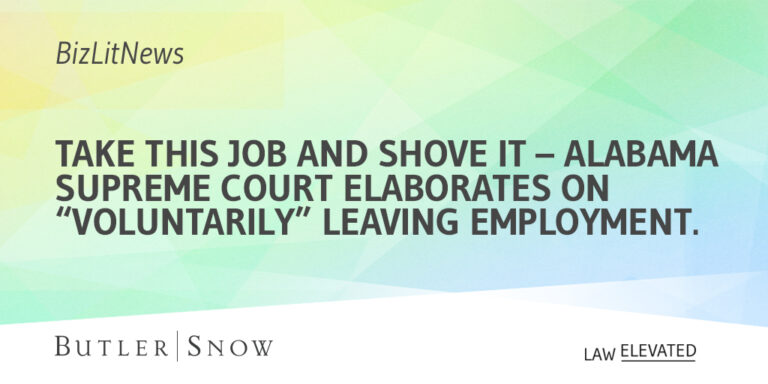If you quit your job because of a hostile work environment, is it still “voluntary”? According to the Alabama Supreme Court’s July 12, 2019 opinion in Arnold v. Hyundai Manuf. Ala., LLC, it is. In Arnold, Hyundai hired Arnold to work in Alabama. Arnold lived in Kentucky at the time, and as part of the job offer, Hyundai agreed to pay certain of Arnold’s relocation expenses. Arnold signed a relocation reimbursement agreement that required him to reimburse Hyundai for all relocation costs paid if he “voluntarily terminates” his employment with Hyundai within 24 months.
Soon after he began work for Hyundai, Arnold claimed that his work conditions deteriorated, and he was subjected to harassment, ridicule and a hostile work environment. This culminated in Arnold’s submission of a letter stating “I will be resigning my position” 16 months after he started with Hyundai. Hyundai later attempted to recoup the relocation expenses and Arnold refused. Hyundai sued Arnold for breach of contract, and obtained summary judgment against him.
Arnold appealed, arguing that he had not breached the reimbursement agreement because he had not voluntarily terminated his employment, but instead was forced to resign. In support of his position, Arnold cited Black’s law Dictionary’s definition of “voluntary” – “unconstrained by interference; not impelled by outside influence.” Arnold contended that under this definition, and in light of the hostile work conditions he experienced, his resignation was not “voluntary.” The Alabama Supreme Court disagreed.
In affirming summary judgment for Hyundai, the Court studied the plain meaning on the term “voluntary.” The Court rules that “The material evidence is undisputed, and it establishes that Arnold made the decision to voluntarily terminate his employment … because he no longer wanted to work at [Hyundai’s] facility.” The Court went on to note that Arnold’s reasons for terminating his employment were irrelevant, because there was no “good cause” provision in the reimbursement agreement.
If that wasn’t bad enough for Arnold, Hyundai had also appealed, contending the amount awarded by the trial court did not include prejudgment interest and attorney’s fees as the reimbursement agreement allowed. The Alabama Supreme Court agreed, and for good measure, tacked on an additional $30,000 to the original $67,000 award to Hyundai and against Arnold.
So, to summarize Alabama law on this issue in a sentence — “I quit” = voluntary (no matter why you quit); “You’re fired” = involuntary.
